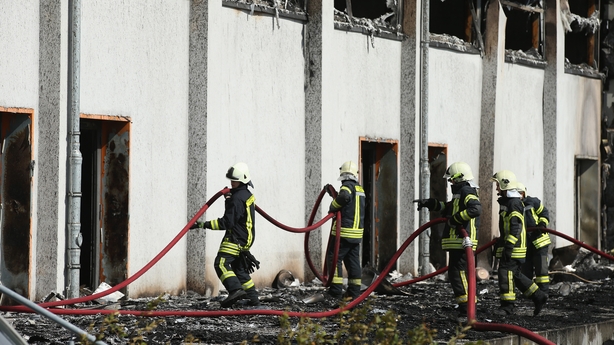The Hungarian government has said it plans to deploy the army to the country’s border with Serbia, as record numbers of refugees and migrants arrive at the EU member state.
The country’s parliament is set to vote on the move at an extraordinary session next week.
Earlier, Hungary’s police chief said more than 2,100 police would be sent to the border.
"The border protection will be reinforced with 2,106 extra police from September 5," Karoly Papp told reporters in Budapest.
Police fired tear gas this morning to prevent around 200 migrants trying to leave main refugee processing centre at Roszke, a police spokesman told AFP.
Spokesman Szabolcs Szenti said that the migrants were refusing to be fingerprinted and that "police are trying to calm the situation, but the migrants are continuing to shout".
Record numbers of migrants travelling to Hungary from Serbia continue to climb, police said earlier, as thousands of people fleeing conflict and hardship desperately try to reach Europe.
More than 2,500 people, the highest ever daily total, crossed Hungary's southern border with Serbia near the town of Roszko yesterday, police said in a statement.
On Monday, there were 2,000 arrivals. Most were Syrian, Afghan and Pakistani nationals, police added.
The migrants crossing into Hungary are part of around 7,000 refugees and migrants whose journey to the European Union was blocked last week when Macedonia declared a state of emergency and shut its borders for three days after being overwhelmed by the influx.
The western Balkans has now become one of the main routes into the EU, as people from the Middle East, Asia and Africa try to reach Germany and other western European countries.
Europe's worst migration crisis since World War II is set to dominate a summit of leaders from the western Balkans tomorrow in Vienna that will also be attended by German Chancellor Angela Merkel.
Germany expects to take in a record 800,000 migrants this year.
Ms Merkel was booed as she arrived at a refugee centre in the eastern town of Heidenau, where a crowd of around 150 people shouted and jeered at her from across the road.
Hungary, which is part of the passport-free Schengen zone, has registered more than 100,000 asylum-seekers so far in 2015, over double the total for all of last year.
The numbers jumped from 150 per day in the first half of this year to more than 2,000 in August, after Hungary's conservative government announced it would build a razor-wire fence along its border with Serbia.
The fence is one of several tough anti-migrant measures, which also include tightening asylum laws, introducing penalties for illegal border crossing, and the planned closure of permanent refugee camps.
Elsewhere, two refugee shelters in Germany have been attacked.
In Leipzig a man was seen throwing a petrol bomb into a refugee home, which was due to house 56 asylum-seekers from today, police said in a statement.
Only a mattress was burned as a witness was able to raise the alarm swiftly.
Meanwhile in the town of Parchim, also in eastern Germany, police arrested two men who had charged into a refugee shelter wielding a knife.
Several residents, who were outside when the incident took place, alerted the police after noticing that one of the two suspects was holding a 20.5cm knife.
Both were shouting anti-migrant comments. Police ran blood tests on them for alcohol levels.

German authorities have been alarmed by a wave of attacks targeting refugee centres.
The town of Heidenau, near Dresden in eastern Germany, was the scene of violent protests over the weekend against the opening of a new centre for refugees.
Ms Merkel criticised the protests as "vile" on Monday, reserving her strong words not just for neo-Nazis but also families with children who joined the anti-migrant demonstrations, calling such support for the protests "shameful".
Meanwhile, the United Nations special representative on migration has said he is concerned about a lack of a joint approach in Europe to the migrant crisis.
Speaking on RTÉ's Morning Ireland, Peter Sutherland said no single country can deal with the matter and that a fair allocation of people across the borders of Europe needs to be implemented.
"The European Commission put forward in May a proposal which is a thoroughly fair one, in my view, that there has to be a fair allocation across the borders of Europe of people who are being taken in and should be offered sanctuary.
"A number of countries simply aren't playing this, they're not prepared to accept it. We have to have a European solution, no single country can deal with this."
Mr Sutherland said there needs to be a rapid adjudication of whether people are entitled to refugee status, and that people should be given reasonable care while this takes place.
He said what is needed now as a first step is an agreement by the member states at council level. He added that this is a challenge for the European Union as a whole but that a number of states, Hungary included, do not want to deal with it.

